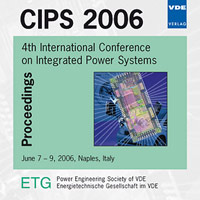Solder Fatigue at High-Power IGBT Modules
Conference: CIPS 2006 - 4th International Conference on Integrated Power Systems
06/07/2006 - 06/09/2006 at Naples, Italy
Proceedings: CIPS 2006
Pages: 6Language: englishTyp: PDF
Personal VDE Members are entitled to a 10% discount on this title
Authors:
Sommer, Johann-Peter; Michel, Bernd (Fraunhofer Institute for Reliability and Microintegration Berlin)
Licht, Thomas; Berg, Hermann; Appelhoff, Klaus (Infineon Technologies AG Warstein, Germany)
Abstract:
The thermo-mechanical reliability of high-power IGBT modules is strongly connected with the thermal resistance between the transistors and the heat sink which is directly influenced by the solder fatigue in the interconnection between the board and the base plate. A combined approach (experimental and numerical) is reported to evaluate the reliability of IGBT modules and to derive life time assessments for several thermal loading regimes like cyclic testing as well as real cycles of operation. Eutectic PbSn as well as lead-free solder alloys are compared. Based on a detailed three-dimensional finite element (FE) discretisation and own measurements of the solder relaxation, the stress-strain behaviour is analysed numerically. Two field distributions, the visco-plastic solder deformation and the visco-plastic energy density, each accumulated during one thermal cycle (TC), allow to derive the direction of damage propagation perpendicularly to the edge of the non-damaged part of the solder joint. Experiments are reported for a wide variety of thermal cycles. Ultrasonic micrographs are presented to visualise the propagating damaged zones. The influence of the temperature-time-relation (duration of heating and cooling phases, thermal amplitude, maximum temperature) on the expected life time is evaluated. The authors compare the numerically forecasted mean cycles to failure (MCF) to the results of thermal cycling experiments and point out the need for an experimentally-numerically combined approach if reliable life time estimations have to be obtained.


